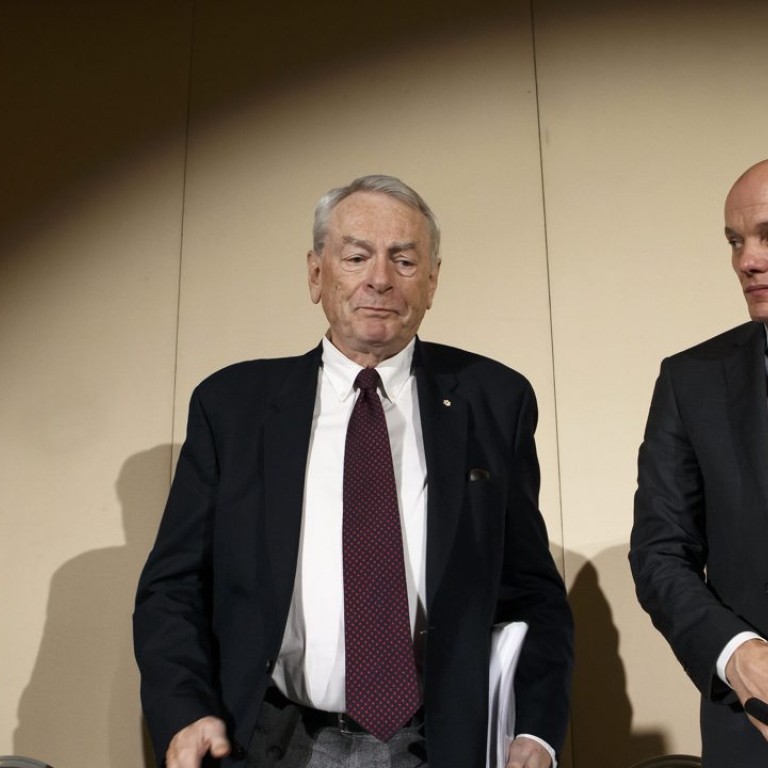
Wada: ‘Deeply rooted culture of cheating’ among Russian athletes
An international anti-doping commission recommends on Monday that Russia’s Athletics Federation be banned from the sport over widespread doping offences – a move that could see the powerhouse excluded from next year’s Rio Olympics
Top Russian athletes have for years participated in a systemic doping regime involving bribery, extortion, and destruction of evidence, according to an international anti-doping agency report released on Monday in Geneva, Switzerland.
The report released by the World Anti-Doping Agency (Wada), which investigated allegations made in a German documentary in December last year, recommended Russia’s banishment from international athletics competitions like the Olympics.
The information in Wada’s Independent Commission Report is alarming. We need time to properly digest and understand the detailed findings
The report found a “deeply rooted culture of cheating” in Russia’s track and field programme and “documented cases where athletes who did not want to participate in ‘the programme’ were informed they would not be considered as part of the federation’s national team for competition”.
Russian doctors and laboratory personnel were also implicated in covering up test results in exchange for money. Investigators concluded Moscow lab officials destroyed more than 1,400 samples after they learned they were the subject of the inquiry.
READ MORE: Athletics in new doping crisis after leaked data reveal hundreds of suspect samples
The commission also identified what it called systemic failures in the global governing body, the International Association of Athletics Federations (IAAF).
The international police body Interpol said it would coordinate a global investigation into suspected corruption and doping in athletics.
The commission said in its report that the London 2012 Olympics had been “sabotaged” by the widespread inaction of international and national anti-doping authorities.
READ MORE: ‘Public opinion is going to move towards the view that all sport is corrupt

“For 2016, our recommendation is that the Russian Federation be suspended, in fact one of our hopes is that they will volunteer that, so that they can take the remedial work in time to make sure that Russian athletes can compete under a new framework if you like,” Dick Pound, president of Wada, told a news conference in Geneva.
Russia finished second behind the United States in the medal table at the 2012 Olympics, with 17 medals, eight of them gold, and has long been one of the chief players in track and field.
The scandal revolves around accusations that money was demanded from top athletes to “bury” medical tests from Russian athletes that showed drug use to enhance performance.
There has never been any suggestion that Fifa corruption has affected results on the pitch, at the World Cup, for example.
Acting president of the Russian Athletics Federation, Vadim Zelichenok, said in a telephone interview that Wada had no powers to exclude Russian sportsmen from competition.
“Secondly, it is only a recommendation ... But I cannot say if the IAAF will follow this recommendation,” he said.
The reach of corruption in global sport could in part be explained by a huge influx of sponsorship in recent decades into bodies lacking effective governance and supervisory procedures.

The IAAF, which has been engulfed in a crisis spanning alleged corruption, bribery and widespread doping cover-ups, said steps would be taken to ban the Russian Athletics Federation (Araf).

“However, I have urged the IAAF Council to start the process of considering sanctions against Araf (Russian Athletics Federation). This step has not been taken lightly.”
The 82-year-old Senegalese is alleged to have received over one million euros (HK$8 million) in bribes in 2011 to cover up positive doping tests by Russian athletes, the office of France's financial prosecutor said.
“It's disappointing to see the nature and the extent of what was going on,” Wada president Dick Pound told a news conference in Geneva immediately after the report was made public.
“It's worse than we thought, it has the effect, unlike other forms of corruption of actually effecting the results on the field of play ... If you can't believe results then there is a serious credibility problem.

“I hope all sports will look at their governance and their anti-doping systems because their existence may be at risk.”
The report also said the London 2012 Olympic had been “sabotaged” by the “widespread inaction” of the IAAF, Araf and the Russian anti-doping agency (Rusada) for allowing tainted athletes to compete.
If proved, the suppression of drug test results in return for bribes would also make a mockery of the huge investment in technical measures to detect drug use and ensure fairness.
Coe said that the IAAF had tested more than 5,000 athletes since 2009; proof, he said, that the organisation was serious about making the sport clean.


